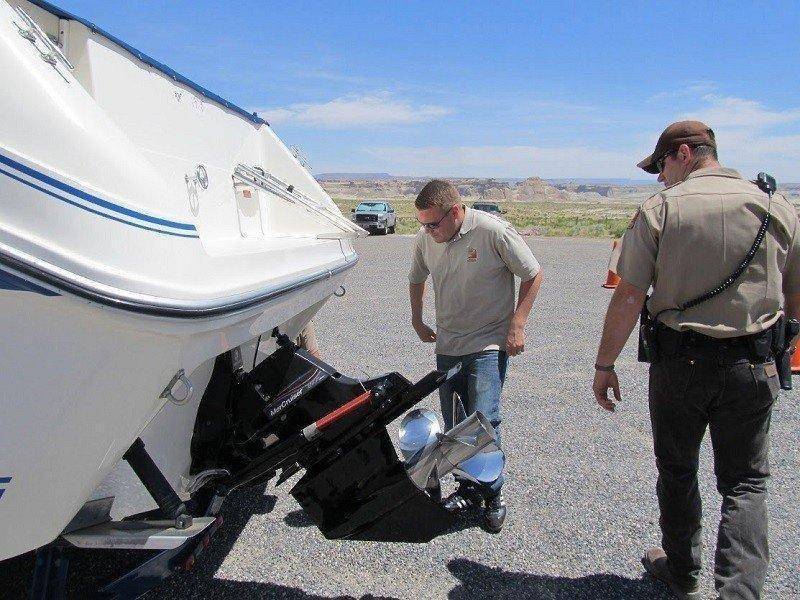DWR Press Release
Boaters must stop at Daniels Canyon point of entry
Heber City — Boaters ‘discovered’ a watercraft inspection station in Wasatch County the hard way recently: they were pulled over and ticketed for not stopping at the station.
The station is at the Daniels Canyon port of entry. The point of entry is along U.S. Highway 40, just southeast of Heber City (near mile marker 22). The Utah Department of Natural Resources established the station to reduce the chance that quagga mussels make their way into Utah. This is the second year the station has been in operation.
Only vehicles that are traveling up the canyon with watercraft—southeast, out of Heber City and Provo—need to stop. Vehicles with watercraft traveling the opposite way down the canyon—northwest toward Heber City—are not required to stop.
Watercraft include boats, personal watercraft (such as Jet Skis and Wave Runners), canoes, kayaks and float tubes. Currently, the station is open only on weekends. Starting Memorial Day weekend, and continuing through the summer, the station will be open seven days a week.
Candace Hutchinson, regional aquatic invasive species (AIS) biologist for the Division of Wildlife Resources, says the inspection station is open only during certain hours. “Signs along Highway 40—near the port of entry—will indicate if the station is open,” she says.
Hutchinson says U.S. 40 is a popular route for boaters and anglers traveling from the Wasatch Front to Starvation and Strawberry reservoirs and waters in the Uinta Basin.
When you pull into the station, DWR AIS technicians will inspect your watercraft for quagga mussels and their cousins, zebra mussels. The amount of time you spend at the station will vary, according to where you’ve been boating and whether your boat has been properly decontaminated:
· If you haven’t visited a body of water that’s infested with quagga mussels, or is suspected of having quagga mussels in it, your wait should be short.
· Your wait should also be short if you’ve visited an infested or suspected water, but your watercraft was professionally decontaminated with hot water. Most major Utah State Parks and DWR regional offices offer professional decontamination for free. But you need to make an appointment to get the decontamination done. A list of locations with hot water decontamination services is available at www.stdofthesea.com.
You can also decontaminate your boat on your own. The decontamination process includes letting your watercraft dry for at least 18 days. Starting June 1, the drying period will shorten to 7 days. (Higher temperatures in the summer kill quagga mussels faster.) Steps to decontaminate your watercraft are available at www.stdofthesea.com.
· Watercraft that have boated on waters that are infested with quagga mussels, or are suspected of having quagga mussels in them—and that have not been properly decontaminated—must be decontaminated by technicians before leaving the port of entry.
“The decontamination process can take up to 30 minutes for larger boats,” Hutchinson says. “Smaller watercraft take less time.”
Other mandatory inspection stations
The inspection station at the Daniels Canyon point of entry isn’t the only mandatory quagga mussel inspection station in Utah. You’ll also find mandatory stations at the following locations:
· The Interstate 15 point of entry near St. George. All watercraft traveling north on I-15 must stop.
· In Garden City and Laketown near Bear Lake. All watercraft traveling to Bear Lake must stop.
· On U.S. Highway 191 near Flaming Gorge Reservoir. All watercraft traveling to Flaming Gorge must stop.
In addition to the inspection stations, DWR officers and biologists also conduct administrative checkpoints along traffic routes that lead out of the Bullfrog and Wahweap marina areas at Lake Powell. The officers and biologists check boats for attached quagga and zebra mussels. They also look for standing water. Citations are issued for both.
Why the concern?
There are many reasons why Utahns don’t want quagga mussels, or their cousins, zebra mussels, in the state:
Reason 1 – Mussels can plug water lines, even lines that are large in diameter.
If mussels get into water pipes in Utah, it will cost millions of dollars to try to remove them. If you live in Utah, you’ll likely pay higher utility bill costs to try to get the mussels removed.
Reason 2 – Mussels remove plankton from the water, the same plankton that supports fish in Utah. The mussels could devastate fisheries in Utah.
Reason 3 – Mussels can get into your boat’s engine cooling system. Once they do, they’ll foul the system and damage the engine.
Reason 4 – When mussels die in large numbers, they stink. And their sharp shells can cut your feet as you walk along the beaches where the mussels died.

